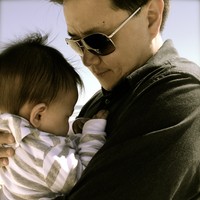This question originally appeared on Quora. 
By Andrew Young Shin, Pediatric Cardiologist
I ate a cockroach.
This requires an explanation.
While a trainee as a pediatric cardiologist during my rotation in the cardiac ICU, I met a stoic twelve year old girl (her fictitious name will be Tammy) diagnosed with heart condition called dilated cardiomyopathy. The heart muscle was weakened to the point where it no longer could sustain the needs of the body without the support of continuous infusions of powerful medications. There was no other option: she needed a heart transplant. She was stuck in the ICU, mostly bed-bound, waiting for a new heart. Depending on where you are in the United States, the average wait period for a matched kid-sized heart to become available for donation is five to six months. For many patients, it's simply too long, and some die waiting.
When I met Tammy, she was emaciated, weakened, depressed, and well into her third month of hospitalization with no word of an available heart. She struggled as an adolescent would - frustrated with life, isolated from her friends, literally plugged into pumps and IV bags, and surrounded by rotating physicians and probing medical students. I couldn't help but to notice that her room was her metaphorical aquarium, cage, even prison cell. Passerby ICU staff would constantly walk by, some would take the time to peer in, a minority would walk in, but mostly to examine her or drop off her meals. I overheard a cardiology fellow joke to another, referring to Tammy as the "mascot" of the cardiac ICU given her extensive length of hospitalization. I'm not entirely sure she didn't overhear it as well. Her view from inside to outside must have solidified the feeling: healthy people laughing, interacting, going home to family and friends.
Tammy's response was to be severely withdrawn. Emotionally shutdown.
When I was assigned to her, I tried to connect with her, but could not get any traction. I was nervous as a new trainee, and my goal really was not to screw up her medical treatment plan. But recognizing her depression, I did consult child psychiatry to help her during this time. I stopped by her bedside multiple times throughout the day to chat, specifically avoiding medical jargon. During the first few weeks, I ended up mostly speaking to her mother, as she stayed withdrawn. After some time, through subtle probing, I discovered one of her favorite TV shows was "Fear Factor" - a reality based TV show that puts contestants through extreme challenges. I started watching the show so that we had something in common to talk about.
I had the idea to bring "Fear Factor" to the Cardiac ICU.
After convincing several of my colleagues, nurses and even the ICU attending to participate, we set up daily challenges for the medical staff to go through, very much in a Fear Factor manner. Wheelchair races, who-would-tolerate-the-biggest-IV-needle, etc. I could tell Tammy was instantly interested. She looked forward to the next challenges. My challenges for her were mostly physical (as a secret agenda to get her rehabilitated: transplant recipients do far better when they are better conditioned). Her interest grew, and she started coming up with challenges of her own. "Put an NG tube in your nose! (she had one), drink the nasty Colace! (she had to do)" Her mother commented to me that for the first time in a long time, she's smiling.
It was a fateful Saturday morning, when I came in for my call, I found both Tammy and her mother sporting an evil grin. They had procured a cockroach to ingest as the next challenge. Everyone instantly refused to partake in this one. So did I. Towards the afternoon, it looked like this challenge was going to be a bust. Tammy was by nature a stoic girl, but I could tell she was more than disappointed. Fearing we would lose the momentum of her new found spirit for life, I mustered up the stomach to entertain the notion. I looked at the dead ghastly thing with as much of a poker face as I could gather. When I said I would try, Tammy giggled with so much delight that I knew there was no turning back. I could not break her already broken heart.
I'll spare you the details of the act itself, but I could see a look of gleeful horror yet immense satisfaction on her face while I was holding my nose and chewing. She clapped with vigor after the unimaginable deed was done. The nurses looked at me with disgust. My colleagues avoided me. But I had the joy of that girl for a few minutes, and it was worth it. That evening, when I was rounding, she was getting ready for bed. I checked in on her vitals and all was stable. I said goodnight, to which she replied, "Thank you for today." For some reason, the way she said it completely warmed my heart.
Early next morning, our team received a call that a heart was available. She received a heart transplant that very day. She sailed through her operation and was discharged to the ward then home shortly thereafter. A few weeks later, I received a photo from her in her Tae Kwon Do uniform - noticeably fuller than her previous emaciated self and ... healthy. In her note, she said "Thanks for being my hero."
Her clinical course was marred with complications and near death experiences. At one point, I was performing CPR on her. A second time, I electrically shocked her for a malignant arrhythmia - both times averting certain death. But I am confident that her hero reference had nothing to do with that. It was all simply because I ate a goddamn cockroach. But it changed my perspective on what it means to "care" for a patient and how to have a meaningful impact as a physician.
More questions on Doctors: